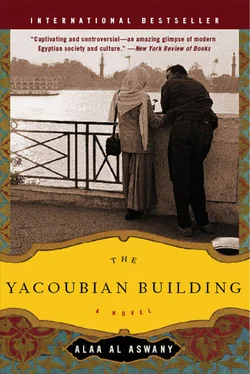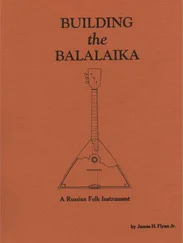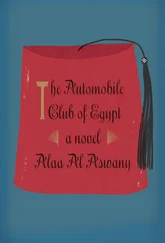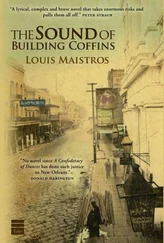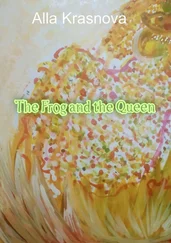Alaa Al Aswany - The Yacoubian Building
Здесь есть возможность читать онлайн «Alaa Al Aswany - The Yacoubian Building» весь текст электронной книги совершенно бесплатно (целиком полную версию без сокращений). В некоторых случаях можно слушать аудио, скачать через торрент в формате fb2 и присутствует краткое содержание. Год выпуска: 2006, ISBN: 2006, Издательство: Adobe Acrobat eBook Reader, Жанр: Современная проза, на английском языке. Описание произведения, (предисловие) а так же отзывы посетителей доступны на портале библиотеки ЛибКат.
- Название:The Yacoubian Building
- Автор:
- Издательство:Adobe Acrobat eBook Reader
- Жанр:
- Год:2006
- ISBN:978-0-06-087813-9
- Рейтинг книги:5 / 5. Голосов: 1
-
Избранное:Добавить в избранное
- Отзывы:
-
Ваша оценка:
- 100
- 1
- 2
- 3
- 4
- 5
The Yacoubian Building: краткое содержание, описание и аннотация
Предлагаем к чтению аннотацию, описание, краткое содержание или предисловие (зависит от того, что написал сам автор книги «The Yacoubian Building»). Если вы не нашли необходимую информацию о книге — напишите в комментариях, мы постараемся отыскать её.
The Yacoubian Building — читать онлайн бесплатно полную книгу (весь текст) целиком
Ниже представлен текст книги, разбитый по страницам. Система сохранения места последней прочитанной страницы, позволяет с удобством читать онлайн бесплатно книгу «The Yacoubian Building», без необходимости каждый раз заново искать на чём Вы остановились. Поставьте закладку, и сможете в любой момент перейти на страницу, на которой закончили чтение.
Интервал:
Закладка:

Glossary
Abd el Halim Hafez: a singer and youth icon (1929–1977) who starred in many movies as the sort of character Busayna describes.
Abduh: a short form of Abd Rabbuh.
Abu Bakr: the first caliph (successor to the Prophet as ruler of the Islamic state) (died 634).
Abu el Aala el Mawdudi: a revolutionary Indian Islamist thinker (1903–1979).
Abu Hamid el Ghazali: a celebrated scholar of medieval Islam (1058–1111).
Abu Wael, i.e., Father of Wael: it is polite to address a parent by his or her child’s name, preceded by “father of ” or “mother of.”
Age of Ignorance (jahiliya ): this term is used in general parlance to mean the period before the announcement by the Prophet Muhammad of his mission. Radical Islamic groups, however, apply it to the (in their eyes) nonobservant mass of Muslim society today.
Ali Badawi: a leading jurist of the 1940s.
Ali ibn Abi Talib: son-in-law of the Prophet and fourth caliph (died 661).
Anwar Wagdi: dashing film star of the late 1940s and early 1950s (1904–1955).
Approval and Light Stores: the name has strong religious connotations, the “Approval” and “Light” referred to being God’s.
El ‘Aqrab Prison: a high-security prison in the Western Desert.
El Azhar: a mosque-university in Cairo and one of the most authoritative seats of Islamic learning.
basbusa: baked semolina soaked in syrup.
Bilharzia: a debilitating liver disease contracted by peasants from parasites in irrigation canals.
Center Platform: in 1975, following the liberalization of the economy under Anwar el Sadat, and by way of liberalizing political life, three wings or platforms were allowed within the Socialist Union — the Right, the Center, and the Left. The Center was understood to represent the ruling regime.
Central Security: a heavily armed branch of the police force used for crowd control at demonstrations or after large public events; the riot police.
Court of Cassation: Egypt’s highest court of appeal.
Dar el Salam: a densely inhabited suburb of southern Cairo.
Drinking Sheikh: the logo of a brand of tea, in the form of an old man elegantly dressed in oriental clothes and holding a small cup in his hand.
Egypt Party: within a year or so of the formation of political platforms within the Socialist Union, the platforms were turned into parties. The Center Platform became the Egypt Party.
Emergency Law: in 1981, following the assassination of President Anwar el Sadat, a state of emergency was declared that suspends the constitution and gives expanded powers to the president; the Emergency Law remains in force to the present time.
emir: “commander”; a title used by Islamist groups to denote the leader of a cell or grouping.
Fatiha: the opening chapter of the Qur’an, often recited to conclude and seal a transaction.
The Fayoum: a large agricultural oasis southwest of Cairo that is said to be Egypt’s poorest rural area.
feddan: a unit of land measurement equal to slightly more than an acre.
Free Officers: a clandestine organization within the Egyptian army that organized the overthrow of the monarchy in 1952.
gallabiya: a full-length gown closed in front, the traditional dress worn by many Egyptians.
Gamaa: i.e., Gamaa Islamiya (the “Islamic Group”), one of the best-known Egyptian militant Islamist groups.
Gezira Club: the oldest, best-known, and most socially desirable club in Cairo, with large grounds in Zamalek.
gihad: Muslims distinguish between the “spiritual” or “greater” gihad, which is the Muslim’s effort toward moral and religious perfection, and the “physical” or “lesser” gihad, which is military action for the expansion or defense of Islam. The “paean to gihad,” referred to in the text, could be any of a number of chants popular among Islamic activists. One such chant (used by the Muslim Brotherhood) goes, “Allah is our god, the Prophet our leader, and to die for Allah our dearest wish.”
hadith: an act or saying of the Prophet Muhammad. Reported Traditions are graded from “weak” to “sound” on the basis of the reliablility of their chains of transmission.
Hagg: title of respect to a man who has made the pilgrimage to Mecca.
Hamas: a Palestinian Islamist political and military movement.
Hizbollah: a Lebanese Islamist political and military movement.
El Hussein: grandson of the Prophet Muhammad; a relic of El Hussein is contained in a large mosque in Cairo’s old city that is the focus of intense popular piety.
Imbaba: a poor and densely populated district on the west bank of the Nile.
El Karadawi, Yusef: an influential Egyptian Islamist preacher, writer, and theorist (born 1926).
Khadra el Shareefa: a character in the traditional epic, The Adventures of the Bani Hilal . The chaisty of a high-born woman, Khadra el Shareefa is unjustly impeached.
Khalid: Khalid ibn el Walid, a leading Companion of the Prophet Muhammad and a commander of the Muslim armies during the early conquests (died 642).
Khaybar: an oasis and settlement in the region of Medina, the Prophet’s capital, that was inhabited by Jews. In retaliation for the latter’s intrigues with local Arab tribes against the nascent Muslim state, Khaybar was attacked, besieged, and finally defeated.
Kotzika substation: located on Marouf Street (a turning off Suleiman Basha Street) and named after a Greek businessman who owned property in the area.
Liberation Organization: founded by the new revolutionary regime of Gamal Abd el Nasser in the early 1950s; the liberation alluded to was that of the Canal Zone, from British occupation.
Mahmoud Said: Egyptian painter (1897–1964) of upper-class background, many of whose paintings depict voluptuous women of the lower classes.
El Mansoura: a large town in the northeast Delta, about a hundred miles from Cairo.
modest dress: the concept of “modest dress” gained currency in Egypt in the 1970s and as usually employed means dress that covers all of a woman’s body except her face and hands, conceals the outlines of her figure, and covers her hair and neck; in an extended interpretation, it may involve the covering of the face and hands as well.
Muhammad Naguib: Egypt’s first president, who acceded to the position in 1953 and was deposed by Gamal Abd el Nasser in 1954.
mulukhiya: a leafy green vegetable (Jews’ mallow or Corchorus olitorius ) that is prepared as a slightly viscous soup.
Muslim Brothers: an Islamist political movement founded in Egypt in 1928.
Nahhas Basha: Prime minister at the time of the 1952 revolution by Gamal Abd el Nasser’s Free Officers against the monarchy.
National Union: replaced the Liberation Union in the wake of the evacuation of foreign troops from Egypt in 1956.
Читать дальшеИнтервал:
Закладка:
Похожие книги на «The Yacoubian Building»
Представляем Вашему вниманию похожие книги на «The Yacoubian Building» списком для выбора. Мы отобрали схожую по названию и смыслу литературу в надежде предоставить читателям больше вариантов отыскать новые, интересные, ещё непрочитанные произведения.
Обсуждение, отзывы о книге «The Yacoubian Building» и просто собственные мнения читателей. Оставьте ваши комментарии, напишите, что Вы думаете о произведении, его смысле или главных героях. Укажите что конкретно понравилось, а что нет, и почему Вы так считаете.
